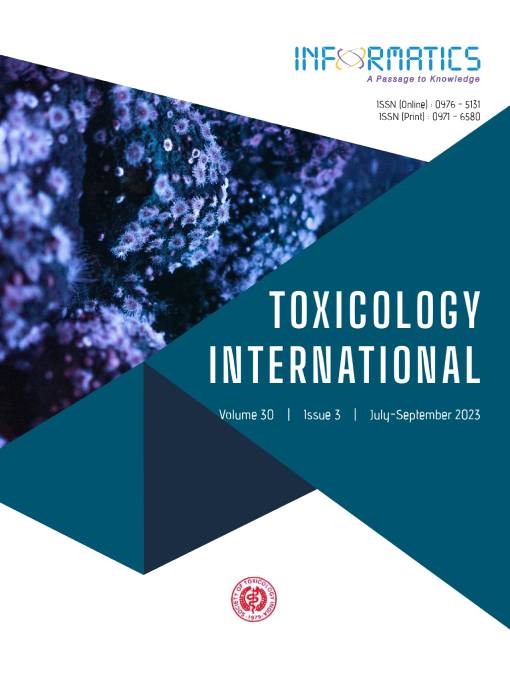Development and Application of a Validated HPLC Method for the Determination of Alpelisib and its Process-Related Impurities in Pure Drug and Pharmaceutical Formulations
DOI:
https://doi.org/10.18311/ti/2023/v30i3/33573Keywords:
Alpelisib, Formulation Analysis, HPLC Analysis, Method Development, Process Related ImpuritiesAbstract
Impurity analysis plays a significant role in the manufacture of a safe pharmaceutical product that ensures the safety of consumers. Keeping this in consideration, the present study was intended to develop a simple and sensitive HPLC method for the resolution and quantification of 4 process-related impurities namely impurities 1, 2, 3 and 4 in alpelisib pure drug and formulations. The method consumes greener solvents as a mobile phase that resolves the analytes on ProntoSIL ODS-C18 (250×4.6 mm; 5 μ id) column at room temperature as stationary phase, ethanol and 0.1% aqueous acetic acid in 65:35 (V/V) at pH 4.5 as mobile phase at 0.8 mL/min flow rate, UV detection at 246 nm. The method can detect the analytes at retention times of 7.05, 4.52, 6.09, 2.88 and 8.14 min respectively for alpelisib, impurity 1, 2, 3 and 4. The analysis was completed with a run time of 15 min that consume less solvent and the same analysis time. The linearity of the proposed method was perceived in the range of 12.5 to 100 μg/mL for alpelisib and 0.0125 to 0.10 μg/mL for impurities. The method can effectively resolve the unknown stress degradation products generated during the stress exposure of alpelisib along with its known impurities in the study. The outcomes of other validation studies were likewise satisfactory and proven adequate for regular analysis of alpelisib and its process-related impurities in bulk drug and pharmaceutical tablet doses.
Downloads
Published
How to Cite
Issue
Section
Accepted 2023-06-30
Published 2023-09-20
References
Armenta S, Garrigues S, Guardia DM. Green analytical chemistry. TRAC-Trend Anal Chem. 2008; 27(6): 497-511. https://doi.org/10.1016/j.trac.2008.05.003 DOI: https://doi.org/10.1016/j.trac.2008.05.003
Koel M, Kaljurand M. Application of the principles of green chemistry in analytical chemistry. Pure Appl Chem. 2006; 78(11):1993-2002. https://doi.org/10.1351/ pac200678111993 DOI: https://doi.org/10.1351/pac200678111993
Tobiszewski M, Mechlinska A, Namiesnik J. Green analytical chemistry – theory and practice. Chem Soc Rev. 2010; 39(8):2869-78. https://doi.org/10.1039/b926439f PMid:20502819 DOI: https://doi.org/10.1039/b926439f
Gałuszka A, Migaszewski Z, Namiesnik J. The 12 principles of green analytical chemistry and the significance mnemonic of green analytical practices. TRAC-trend Anal Chem. 2013; 50:78-84. https://doi.org/10.1016/j. trac.2013.04.010 DOI: https://doi.org/10.1016/j.trac.2013.04.010
Płotka J, Tobiszewski M, Sulej AM, Kupska M, Gorecki T, Namiesnik J. Green chromatography. J Chromatogr A. 2013; 1307:1-20. https://doi.org/10.1016/j.chroma.2013.07.099 PMid:23932374 DOI: https://doi.org/10.1016/j.chroma.2013.07.099
André F, Ciruelos E, Rubovszky G, Campone M, Loibl S, Rugo HS, et al. PIK3CA-mutated, hormone receptorpositive advanced breast cancer. N Engl J Med. 2019; 380(20):1929–40. https://doi.org/10.1056/NEJMoa1813904 PMid:31091374 DOI: https://doi.org/10.1056/NEJMoa1813904
André F, Ciruelos EM, Juric D, Loibl S, Campone M, Mayer IA, Rubovszky G, et al. Alpelisib plus fulvestrant for PIK3CA-mutated, hormone receptor-positive, human epidermal growth factor receptor-2–negative advanced breast cancer: Final overall survival results from SOLAR-1. Ann Oncol. 2021; 32(2):208-17. https://doi.org/10.1016/j. annonc.2020.11.011 PMid:33246021 DOI: https://doi.org/10.1016/j.annonc.2020.11.011
Ye Y, Huang Z, Zhang M, Li J, Zhang Y, Lou C. Synergistic therapeutic potential of alpelisib in cancers (excluding breast cancer): Preclinical and clinical evidence. Biomed Pharmacother. 2023; 159:114183. https://doi.org/10.1016/j. biopha.2022.114183 PMid:36641927 DOI: https://doi.org/10.1016/j.biopha.2022.114183
Wang Q, Lan X, Zhao Z, Su X, Zhang Y, Zhou XY and Xu RA. Characterization of Alpelisib in rat plasma by a newly developed UPLC-MS/MS method: Application to a drug-drug interaction study. Front Pharmacol. 2021; 25(12):743411. https://doi.org/10.3389/fphar.2021.743411 PMid:34899297 PMCid:PMC8656162 DOI: https://doi.org/10.3389/fphar.2021.743411
Seo SW, Kim JM, Han DG, Geum D, Yun H, Yoon IS. A sensitive HPLC-FLD method for the quantification of alpelisib, a novel phosphatidylinositol 3-kinase inhibitor, in rat plasma: Drug metabolism and pharmacokinetic evaluation in vitro and in vivo. J Chromatogr B Analyt Technol Biomed Life Sci. 2021; 1163:122508. https://doi.org/10.1016/j.jchromb.2020.122508 PMid:33387858 DOI: https://doi.org/10.1016/j.jchromb.2020.122508
Majumder T, Gubbiyappa SK. Development and validation of LC–MS/MS method for alpelisib quantification in human plasma: Application to pharmacokinetics in healthy rabbits. J Appl Pharm Sci. 2023; 13(03):089-96. https://doi. org/10.7324/JAPS.2023.75269 DOI: https://doi.org/10.7324/JAPS.2023.75269
Lee S, Kim MS, Jeong JW, et al. Bioanalysis of alpelisib using liquid chromatography–tandem mass spectrometry and application to pharmacokinetic study. J Anal Sci Technol. 2022; 31:1603. https://doi.org/10.7324/JAPS.2023.75269 DOI: https://doi.org/10.1186/s40543-022-00340-7
Yong X, Yanping Y, Jing Y, Zhaoze F, Wei D, Long C. Novel synthesis method of PI3K inhibitor Alpelisib. 2020; Patent No. CN111057051A, China.
Bikshal BK, Useni RM, Venkateswara RA, Maheshwara RL. Intended high-performance liquid chromatography procedure for the quantification of norfloxacin and its potential impurities in active pharmaceutical ingredient and tablet dosage forms. Thai J Pharm Sci. 2018; 42(1):27- 36.
Mallu UR, Anna VR, Kasimala BB. Rapid stability indicating HPLC method for the analysis of leflunomide and its related impurities in bulk drug and formulations. Turk J Pharm Sci. 2019; 16:457- 65. https://doi.org/10.4274/tjps.galenos.2018.34635 PMid:32454750 PMCid:PMC7227885 DOI: https://doi.org/10.4274/tjps.galenos.2018.34635
Babu BK, Rao RA, Reddy UM. Stability-indicating reversedphase HPLC method for the separation and estimation of related impurities of cilnidipine in pharmaceutical formulations. Indian Drugs. 2018; 55(12):41-9. https://doi.org/10.53879/id.55.12.11185 DOI: https://doi.org/10.53879/id.55.12.11185
Girija SK, Babu BK, Rao VA. A new high-performance liquid chromatography method for the separation and simultaneous quantification of eptifibatide and its impurities in pharmaceutical injection formulation. Int J App Pharm. 2021; 13(2):165-72. https://doi.org/10.22159/ ijap.2021v13i2.39895 DOI: https://doi.org/10.22159/ijap.2021v13i2.39895
ICH validation of analytical procedures: Text and methodology Q2(R1); 1994. p. 1-13.
 Jammu Harish
Jammu Harish







